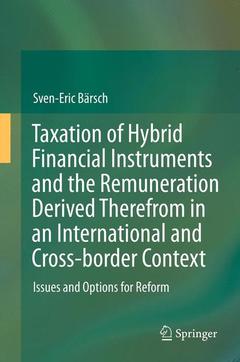Description
Taxation of Hybrid Financial Instruments and the Remuneration Derived Therefrom in an International and Cross-border Context, 2013
Issues and Options for Reform
Author: Bärsch Sven-Eric
Language: English
Subjects for Taxation of Hybrid Financial Instruments and the...:
Approximative price 158.24 €
In Print (Delivery period: 15 days).
Add to cartPublication date: 01-2015
Support: Print on demand
Approximative price 158.24 €
In Print (Delivery period: 15 days).
Add to cartPublication date: 12-2012
390 p. · 15.5x23.5 cm · Hardback
Description
/li>Contents
/li>Comment
/li>
Despite the enormous diversity and complexity of financial instruments, the current taxation of hybrid financial instruments and the remuneration derived therefrom are characterized by a neat division into dividend-generating equity and interest-generating debt as well as by a coexistence of source- and residence-based taxation. This book provides a comparative analysis of the classification of hybrid financial instruments in the national tax rules currently applied by Australia, Germany, Italy and the Netherlands as well as in the relevant tax treaties and EU Directives. Moreover, based on selected hybrid financial instruments, mismatches in these tax classifications, which lead to tax planning opportunities and risks and thus are in conflict with the single tax principle, are identified. To address these issues, the author provides reform options that are in line with the dichotomous debt-equity framework, as he/she suggests the coordination of either tax classifications or tax treatments.
Includes supplementary material: sn.pub/extras
Includes supplementary material: sn.pub/extras




